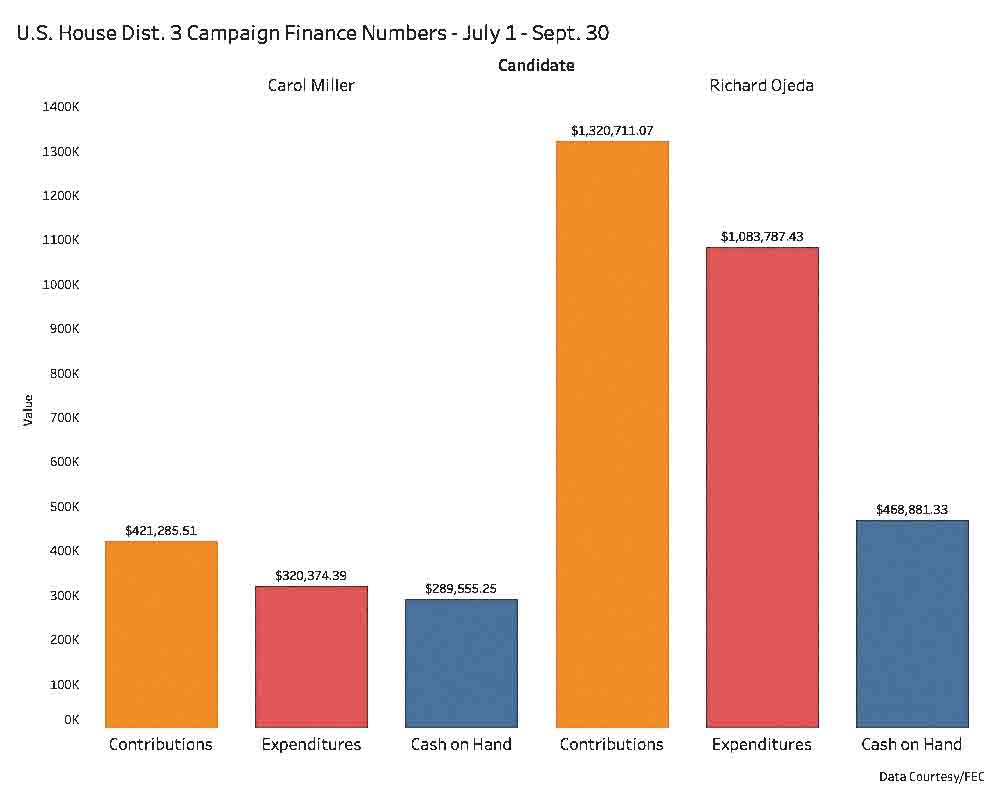U.S. Senate, House candidates turn in finance reports

CHARLESTON — West Virginia’s races for the U.S. Senate and U.S. House of Representatives are gaining national attention and raking in thousands of dollars in campaign donations.
Federal candidates had until Monday to file their October quarterly statements with the Federal Election Commission. The October quarterly report covers donations and expenditures between July 1 and Sept. 30.
In the U.S. Senate race, Republican state Attorney General Patrick Morrisey was able to edge out U.S. Sen. Joe Manchin, D-W.Va., in fundraising, but the incumbent senator still has more money in the bank.
Morrisey raised approximately $1.47 million during the October quarterly reporting period, or about 1 percent more than Manchin, who raised approximately $1.46 million during the same time period. Morrisey couldn’t come close to outspending Manchin, who spent $3.57 million compared to Morrisey’s approximately $968,000 in expenditures. Manchin also has more money in the bank, with $4.2 million in cash on hand compared to Morrisey’s $1.63 million.
Polling for the Manchin/Morrisey competition is all over the place. A Manchin internal poll from Global Strategy Group released at the beginning of October showed Manchin with a 12 point lead, with 48 percent support compared to 36 percent support of Morrisey. Another poll paid for by the National Republican Senatorial Committee released last week showed a 1 point difference, with Manchin leading with 41 percent compared to Morrisey with 40 percent.

While Manchin has the money, Morrisey may have the biggest chip to play in the race: the support of President Donald Trump. A Monmouth University poll released Tuesday showed that Trump still enjoys much support in West Virginia, with 63 percent of respondents approving of the president compared to a 35 percent disapproval rate.
Trump has already visited West Virginia twice to stump for Morrisey, first in Charleston and three weeks ago in Wheeling. Another visit to West Virginia has been hinted at by the Trump campaign.
West Virginia’s races in the 1st and 2nd congressional districts are not receiving as much national interest.
First District Rep. David McKinley, R-W.Va., raised 66.47 percent more than Democratic challenger Kendre Fershee. McKinley brought in $218,320 to Fershee’s $109,396, and McKinley also outspent Fershee by 81.83 percent and has a war chest of $948,810 compared to Fershee’s $72,915.
In the 2nd Congressional District, U.S. Rep. Alex Mooney, R-W.Va., enjoys a slight lead in fundraising over Democratic challenger Talley Sergent. Mooney brought in 4.16 percent more than Sergent, with $236,985 compared to the $227,317 brought in by Sergent. He also spent 59.37 percent more than Sergent and has approximately $1.5 million in the bank compared to the quarter of a million Sergent has in cash on hand.
It’s the 3rd Congressional District race that has the attention of national politicos and pollsters. The seat flipped from blue to red when Evan Jenkins defeated 37-year incumbent Nick Rahall in 2014. Jenkins decided not to run for re-election in 2018, instead running and losing the May 8 Republican primary for U.S. Senate.
He resigned in September to accept an appointment to the West Virginia Supreme Court of Appeals and is running to complete the term of former justice Robin Davis, who resigned in August after being impeached.
Democrats hope to flip the seat back to blue by electing state Sen. Richard Ojeda, D-Logan. Republicans picked Carol Miller, the majority whip for the House of Delegates, to keep the seat in GOP hands.
According to Elections Commission records, Ojeda has a substantial lead in fundraising over Miller, with Ojeda hauling in $1.32 million during the October quarterly reporting period, or 103 percent more than Miller raised. Ojeda outspent Miller by 109 percent, but he only has 47 percent more cash on hand than Miller. She has approximately $290,000 compared to Ojeda’s $469,000.
The Monmouth poll released Monday focused on the 3rd Congressional District race. According to the results, Miller leads Ojeda 48 percent to 45 percent. When Monmouth calculated for a potential Democratic voter surge, the results only changed in Ojeda’s favor by 1 point. In June, Monmouth found that Ojeda led Miller 47 percent to 42 percent.
“Ojeda’s share of the vote hasn’t really moved since the summer while Miller’s standing has risen,” said Patrick Murray, director of the independent Monmouth University Polling Institute. “These results are a sign of Republican voters returning to the fold in a district that leans Republican, especially in its support of the president.”
Monmouth conducted its most recent poll Oct. 10-14 with 350 likely voters and the poll has a margin of error of 5.2 percent.







